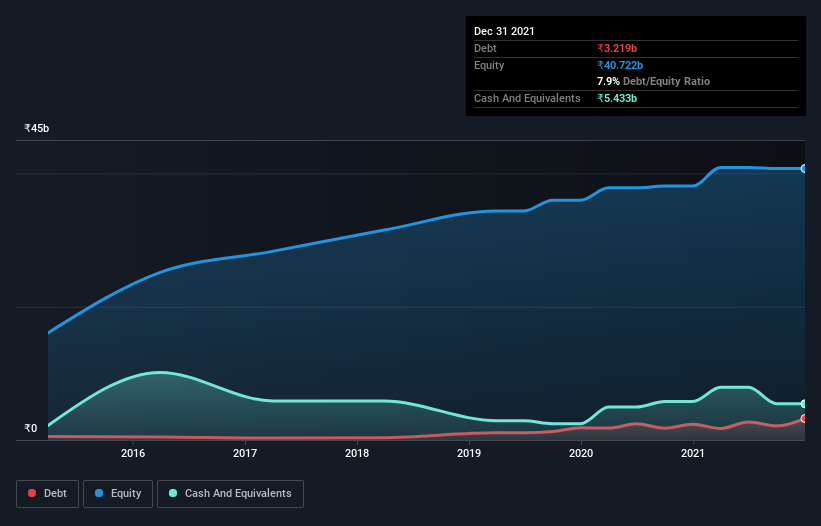Is Kansai Nerolac Paints (NSE:KANSAINER) Using Too Much Debt?

The external fund manager backed by Berkshire Hathaway's Charlie Munger, Li Lu, makes no bones about it when he says 'The biggest investment risk is not the volatility of prices, but whether you will suffer a permanent loss of capital.' So it might be obvious that you need to consider debt, when you think about how risky any given stock is, because too much debt can sink a company. As with many other companies Kansai Nerolac Paints Limited (NSE:KANSAINER) makes use of debt. But the real question is whether this debt is making the company risky.
When Is Debt Dangerous?
Debt assists a business until the business has trouble paying it off, either with new capital or with free cash flow. If things get really bad, the lenders can take control of the business. However, a more common (but still painful) scenario is that it has to raise new equity capital at a low price, thus permanently diluting shareholders. Of course, plenty of companies use debt to fund growth, without any negative consequences. The first thing to do when considering how much debt a business uses is to look at its cash and debt together.
View our latest analysis for Kansai Nerolac Paints
What Is Kansai Nerolac Paints's Net Debt?
As you can see below, at the end of September 2021, Kansai Nerolac Paints had ₹3.22b of debt, up from ₹2.35b a year ago. Click the image for more detail. However, its balance sheet shows it holds ₹5.43b in cash, so it actually has ₹2.21b net cash.

A Look At Kansai Nerolac Paints' Liabilities
We can see from the most recent balance sheet that Kansai Nerolac Paints had liabilities of ₹14.1b falling due within a year, and liabilities of ₹2.10b due beyond that. Offsetting this, it had ₹5.43b in cash and ₹12.1b in receivables that were due within 12 months. So it can boast ₹1.26b more liquid assets than total liabilities.
Having regard to Kansai Nerolac Paints' size, it seems that its liquid assets are well balanced with its total liabilities. So it's very unlikely that the ₹256.2b company is short on cash, but still worth keeping an eye on the balance sheet. Simply put, the fact that Kansai Nerolac Paints has more cash than debt is arguably a good indication that it can manage its debt safely.
On the other hand, Kansai Nerolac Paints saw its EBIT drop by 3.9% in the last twelve months. If earnings continue to decline at that rate the company may have increasing difficulty managing its debt load. When analysing debt levels, the balance sheet is the obvious place to start. But ultimately the future profitability of the business will decide if Kansai Nerolac Paints can strengthen its balance sheet over time. So if you want to see what the professionals think, you might find this free report on analyst profit forecasts to be interesting.
Finally, a business needs free cash flow to pay off debt; accounting profits just don't cut it. Kansai Nerolac Paints may have net cash on the balance sheet, but it is still interesting to look at how well the business converts its earnings before interest and tax (EBIT) to free cash flow, because that will influence both its need for, and its capacity to manage debt. In the last three years, Kansai Nerolac Paints's free cash flow amounted to 44% of its EBIT, less than we'd expect. That weak cash conversion makes it more difficult to handle indebtedness.
Summing up
While it is always sensible to investigate a company's debt, in this case Kansai Nerolac Paints has ₹2.21b in net cash and a decent-looking balance sheet. So we don't have any problem with Kansai Nerolac Paints's use of debt. There's no doubt that we learn most about debt from the balance sheet. But ultimately, every company can contain risks that exist outside of the balance sheet. For instance, we've identified 2 warning signs for Kansai Nerolac Paints that you should be aware of.
Of course, if you're the type of investor who prefers buying stocks without the burden of debt, then don't hesitate to discover our exclusive list of net cash growth stocks, today.
Valuation is complex, but we're here to simplify it.
Discover if Kansai Nerolac Paints might be undervalued or overvalued with our detailed analysis, featuring fair value estimates, potential risks, dividends, insider trades, and its financial condition.
Access Free AnalysisHave feedback on this article? Concerned about the content? Get in touch with us directly. Alternatively, email editorial-team (at) simplywallst.com.
This article by Simply Wall St is general in nature. We provide commentary based on historical data and analyst forecasts only using an unbiased methodology and our articles are not intended to be financial advice. It does not constitute a recommendation to buy or sell any stock, and does not take account of your objectives, or your financial situation. We aim to bring you long-term focused analysis driven by fundamental data. Note that our analysis may not factor in the latest price-sensitive company announcements or qualitative material. Simply Wall St has no position in any stocks mentioned.
About NSEI:KANSAINER
Kansai Nerolac Paints
Manufactures and supplies paints and varnishes, enamels, and lacquers in India.
Flawless balance sheet established dividend payer.
Similar Companies
Market Insights
Community Narratives



